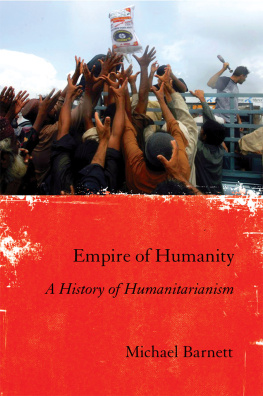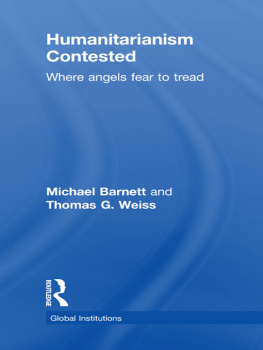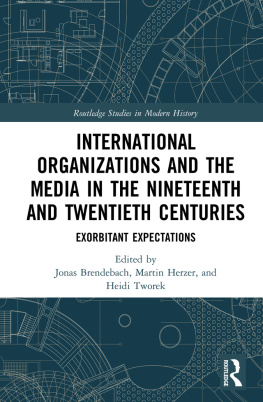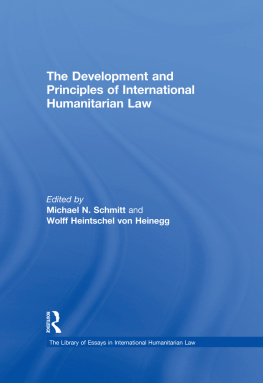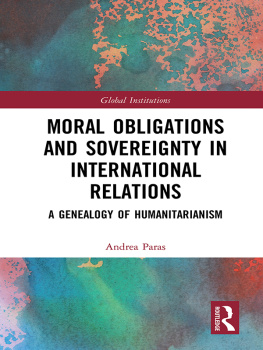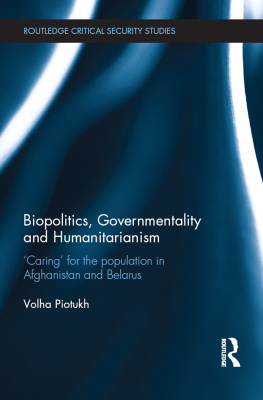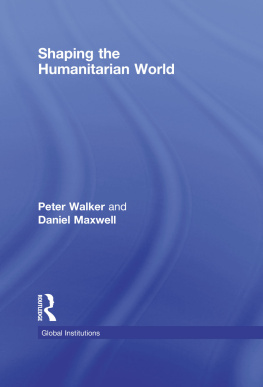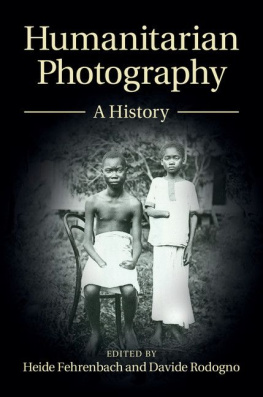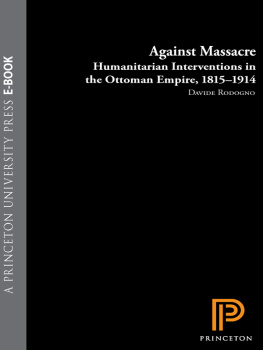Acknowledgments
THIS BOOK is a lot like humanitarianism in two critical respects: It began with modest ambitions and then expanded beyond beliefperhaps too much for its own good. And it depended on acts of kindness, sometimes from strangers, but in many cases from friends. I cannot thank everyone who helped me over the years, but there are quite a few who deserve recognition.
I have benefited greatly from participating in various events and meetings over the years. In 20032004, with the support of Craig Calhoun and the Social Science Research Council, I helped to convene a seminar series on humanitarianism; in addition to influencing my views, it also led to Humanitarianism in Question, which I edited with Tom Weiss. A sincere thank you, once again, to the participants in that series and the contributors to the volume. In 20052006, Raymond Duvall and I organized a Mellon-sponsored Sawyer Seminar series on Humanitarianism and World Order, which provided the opportunity for an interdisciplinary group of graduate students and faculty at the University of Minnesota to engage a series of controversies and to invite several truly remarkable scholars and practitioners to reflect on their work. In addition to those who participated in the seminar series, I owe much to my collaborator, Bud Duvall. Around this time I also began delving into the relationship between religion and humanitarianism, which might not have happened (and certainly not in the same way) had it not been for a generous grant from the Luce Foundation. The activities surrounding this grant allowed me to interact with a remarkable group of individuals, including, most importantly, Janice Stein, who became a very dear friend in the process. This grant gave me the opportunity to work with an extraordinary group of individuals, including those from the American University in Cairo, the University of Toronto, New York University, the International Council on Voluntary Associations in Geneva, the Centre for Conflict, Development, and Peacebuilding at the Graduate Institute of International and Development Studies in Geneva, and the Humanitarian Forum in London. Although these events included a cast of dozens, special thanks go to Dr. Hany al-Bannah, James Shaw-Hamilton, and Ed Schenkenberg, who put their time and resources behind the events. Because of my growing interest in religion in world affairs, I was invited to join two other collaborative projects, one at the Social Science Research Council and the other organized by Jack Snyder at Columbia University. Once again, I learned a tremendous amount.
In many ways my deepest gratitude goes to the practitioners I met along the way, at their headquarters, at meetings, and in the field. I dont expect that they will agree with everything I have to say (though I hope they agree with much), and at times I worry that they might find the book overly critical. This is probably the proper place to confess that I committed a grave social science sin: I fell in love with my subject. At times I have found myself living vicariously through those practitionersadmiring that they had the courage of their convictions and, wishing, at times, that I could be more like them. I want to give a special thanks to those aid agencies that opened their doors and provided access to archives and, in some cases, individuals who really made a difference. World Vision (thanks to Steve Gray), Care International (thanks to JoEllen Saeli), Lutheran World Relief, Doctors without Borders (thanks to Nicolas de Torrente) and Catholic Relief Services (thanks to Regina Martin) were incredibly generous with their time.
I have imposed my drafts on many kind readers, and I have greatly benefited from their comments. Stephen Hopgood, Janice Stein, Bud Duvall, Tom Weiss, Bertrand Taithe, Antonio Donini, Fiona Terry, Tim Shah, Kevin Hartigan, Martha Finnemore, Kathryn Sikkink, and the anonymous reviewers at Cornell University Press saved me from lots of errors, some big and some spectacular. I also have had memorable conversations and exchanges; thanks to James Orbinski, David Kennedy, Andrew Natsios, Brian Atwood, Nancy Lindborg, Emanuel Adler, Peter Walker, Kate Wolford, Christopher Kaufmann, Judith Randel, and Dr. Hany el-Banna.
Thanks to Rebecca Cohen, Denis Kennedy, Jennifer Hawkes, Sandra Borda, and Hunjoon Kim for research assistance and to Keith Vargo and Jeremy Gordon for administrative assistance.
I have benefited from feedback at various locations, including Duke University, the University of Minnesota, George Washington University, the University of Pennsylvania, the University of Chicago, Simon Fraser University, the American University in Cairo, and Oxford University. I learned a tremendous amount from the participants at a manuscript workshop at the School of Oriental and African Studies, so much so that a book that I thought was almost finished got delayed by several months by a major rewrite. I am indebted to Stephen Hopgood and Leslie Vinjamuri for organizing the event.
I am especially grateful to the United States Institute of Peace and, especially, the Harold Stassen Chair at the University of Minnesota for their financial support. I reuse some of the material from my Evolution without Progress? Humanitarianism in a World of Hurt, International Organization 63, no. 4 (October 2009) 62163. Copyright 2009 The IP Foundation. Reprinted with the permission of Cambridge University Press. For permission to reproduce , I thank the Israel Museum, Jerusalem, and the Artists Rights Society, New York.
Although all the aforementioned people helped me along the way, Roger Haydon looms larger than life and above them all. I cannot exaggerate how critical he has been to the books formulation and execution and how fortunate I am to have benefited from his intelligence and friendship on this book (and the others). Also at Cornell University Press, many thanks to Martin Schneider for helping to transform the manuscript into a book, and to Karen Laun for seeing the book through the production process.
I dedicate this book to my wife, Victoria. She reminds me a lot of the aid workers that I have encountered: not quite a selfless, sacrificing saint, but with more compassion than just about anyone I know. Without her care, love, and friendship, this book (and just about everything else I have come to enjoy in life) would not have been possible. This book does not begin to begin to balance the scales, but for now, it will have to do.
h
Co-Dependence: Humanitarianism and the World
THROUGHOUT HISTORY, religious, spiritual, and philosophical commitments have inspired acts of compassion. If we equate humanitarianism with compassion, then humanitarianism is as old as history. But if we decide to limit the history of humanitarianism to when individuals started using the concept to characterize their actions and those of others, then humanitarianism is roughly two centuries old. Specifically, around the turn of the nineteenth century humanitarianism slowly entered into everyday vocabulary. Although there is no bright line to distinguish humanitarianism clearly from previous and current forms of charity, compassion, and philanthropy, three characteristics arose in the early nineteenth century, and have been present ever since, that are marks of distinction.
It slowly became associated with compassion across boundaries. In the beginning humanitarianism included both international and domestic action; it could refer to either abolitionists or advocates for child labor reform. Precisely when and why the concept of humanitarianism became reserved for border-busting action is unclear, though the creation of the ICRC in 1863 as the worlds first official international humanitarian organization probably was a tipping point. The specific association of compassion across boundaries is related to the presumption that humanitarianism implies going beyond the call of duty. Who has duties to whom? People, organizations, and governments provide local assistance on a daily basis, and most of the time we describe them as fulfilling their duties and do not call them or their actions humanitarian. Parents feed, clothe, and shelter their children, and it would sound odd to describe such actions as humanitarian. A police officer responding to a crime is not a Good Samaritanshe is doing her job. Villages often have a moral economy that materializes when famine, destitution, and hardship strike; members of the community are doing their duty. We expect citizens and the government to act when another part of the country is struck by a natural disaster. Few in the United States characterized the Bush administrations response to Hurricane Katrina in 2005 as humanitarian; it was acting (or failing to act) according to its responsibilities. It is only when such assistance crosses a boundary that we tend to call it humanitarian. What duties do we have to each other? It is impossible to identify them in advance precisely because they are formed in and around changing material forces and moral sentiments; are understood differently in different kinds of humanitarianism; and vary with the moral boundaries of the community.
Next page
